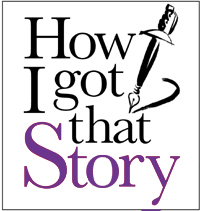Reacting to former Chicago Reader staffer Edward McClelland's piece in Columbia Journalism Review arguing that alt-weeklies were no longer hip, Washington City Paper assistant managing editor Jule Banville shares an anectdote from a J-school job fair last year. "The kids lined up to talk to me. A staff writer from the Philadelphia City Paper also had trouble coming up for air," she says. "For these grads -- still -- alt-weeklies were where it was at ... they didn't want to have to slug it out at a podunk daily churning out cop briefs and obits. Yet, they were beaten down enough to know they're nowhere near ready for a magazine job."
In the twelfth installment of this year's "How I Got That Story" series, Jeffrey Anderson talks about his multi-part investigative series "The Town the Law Forgot," which uncovered shocking abuses of power by government officials in Los Angeles County. He tells Sam Stoker how he started on this thread, and how he kept at it until it all started to unravel for him. Anderson, who wrote the series for L.A. Weekly but has since changed coast and is a staffer at Baltimore City Paper, also gives some advice to anyone undertaking an investigation. "The main thing is you just can't plan things out in advance," he says. "Things don't occur logically sometimes. You just need to be ready to revive things you have let go of. You just can't plan it."
American Community Newspapers, which purchased the Columbus, Ohio, alt-weekly in May 2007, announced on Tuesday its intent to voluntarily remove its stock from NYSE Alternext (formerly the American Stock Exchange). The move will "save management time and attention" and also "eliminate listing fees and result in reduced expenses," according to a press release. The company expects its last day on the exchange to be Nov. 11, but shares could continue to trade on an over-the counter basis after the delisting takes effect.
Creative Loafing (Tampa) editor David Warner (who used to work at Philadelphia City Paper) and City Paper editor Brian Howard (who didn't work in Tampa, but whose grandfather lives there) make a friendly wager on the Rays and Phillies and, most importantly, find a way to create a poll that drives traffic on their blogs.
City Paper publisher Paul Curci invited graphic design and industrial design students from the University of the Arts to rework the paper's street boxes, and "the results are, by and large, stunning," according to editor Brian Howard. The mock-ups use ideas ranging from the utilitarian (a box that collects rain water and funnels it into a street-level dog bowl) to the futuristic (the "multi-lingual distributional information kiosk" pictured at left which features solar power, USB and headphone ports, and allows individuals to print out personalized issues of the paper). A jury that included arts professionals and Curci chose winners, some of which may be produced in the coming year.
According to a case management summary (pdf) filed in Creative Loafing's bankruptcy proceedings on Monday, revenues are off at the six-paper alt-weekly chain. Atlanta Magazine's Steve Fennessy reports that when CL was looking for financing to purchase the Chicago Reader and Washington City Paper, it projected the expanded company would see revenues of $43 million in fiscal year 2008. But the court filing says that revenue in FY08, ending June 30, 2008, was $35 million, and predicts that sales in the first quarter of FY09 will be only $3.5 million. In other CL bankruptcy news, Washington City Paper has published a statement from one of the company's lenders, Atalaya, which says the bankruptcy filing was "unfortunate and unnecessary," and assures "all interested parties that Atalaya has no intention of attempting to shut down the business." MORE: City Paper editor Erik Wemple talks to the George Washington University student paper The Hatchet about the changes in store as the paper shifts focus.
Atlanta Magazine's Steve Fennessy reports that during Wednesday's bankruptcy proceedings, Creative Loafing's lenders "fired a shot across the bow" at CEO Ben Eason, "saying in court papers that the bankruptcy filing was a gambit by Eason to preserve control of the company and 'dodge' the lenders' 'bargained-for rights to have a say in corporate governance.'" The lenders, Atalaya Funding and BIA Digital Partners, filed a motion (pdf) to reverse the earlier court injunction against them, which prevented them from seizing CL's assets. However, according to Washington City Paper, the judge struck down that motion on Wednesday. "It was a legal maneuver they were doing to get more control," Eason says. "When we filed the bankruptcy, there was a concern that Atalaya or BIA might use the collateral as a part of the bankruptcy to come in the backdoor and use the shares to basically foreclose on the shares and function as the board of directors." MORE: Former Creative Loafing (Atlanta) publisher Michael Sigman weighs in.
Playing off of parent company Creative Loafing's recent filing for Chapter 11 bankruptcy protection, Washington City Paper says in a spoof news release and court filing that it has filed "voluntary petitions for content reorganization, citing diminished staff and the flagging confidence of its readers." The release notes that the paper "will continue to publish under court protection from its readers, who have wielded an unreasonable degree of power over the publication's future."
- Go to the previous page
- 1
- …
- 10
- 11
- 12
- 13
- 14
- 15
- 16
- …
- 42
- Go to the next page

